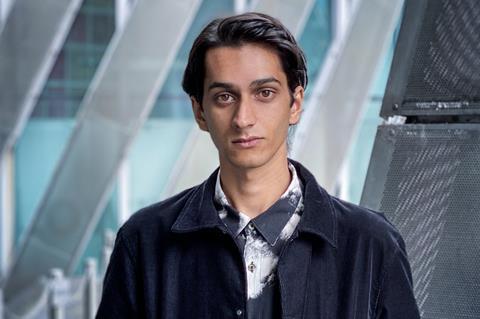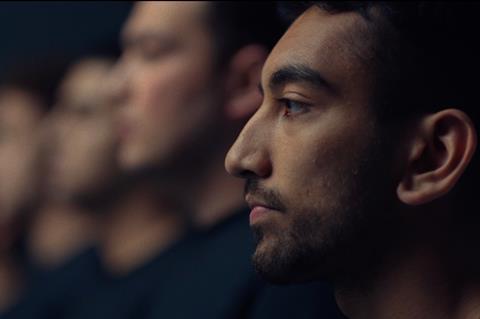
A combination of support from Creative UK’s low-budget feature scheme iFeatures and UK funders BBC Film and the BFI Film Fund allowed Naqqash Khalid to be as bold as he wished with his debut feature In Camera, which premieres today (July 1) in the Proxima section at Karlovy Vary International Film Festival.
In Camera follows Aden, a young actor stuck in a cycle of nightmarish auditions, who takes it upon himself to find a new part to play. The film plays with ideas of reality and identity. “There’s a more palatable version of this film; I’m just not interested in making that,” says Khalid.
The feature is the first from the 2019 iFeatures slate to make it to screen, with the low-budget Creative UK programme still on hiatus having been paused during the pandemic. Khalid had been developing it for four years before he was selected in 2019. “It consumed my thoughts for a long time,” he says. “It’s like putting together a puzzle; all of the pieces feel very lived-in.”
Having studied English at the University of Salford, Khalid cut his filmmaking teeth with 2016 short Parts, made in 12 hours with a crew found on Craigslist; and then 2018’s Stock, part of Sky Arts’ Art 50 project, which featured artists responding to post-Brexit Britain and saw the lead actor’s visa run out midway through the shoot.
For iFeatures, he made an unconventional submission. Instead of a traditional script with scenes and dialogue, he wrote moments in the film like music tracks, with a side A and side B, and a ‘beat switch’ in the middle, inspired by Frank Ocean’s 2016 album Blonde. “I wasn’t interested in making a three-act structure, conventional screenplay. The three-act structure is such a neat way to tell a story, and we live in a messy time,” says the director. “Things feel much more confused, turbulent and heightened. This film seemed to demand a specific process from the beginning.”
Of 12 filmmaking teams on the 2019 iFeatures intake, In Camera was one of only two without a producer attached. Mary Burke, then senior executive at the BFI Film Fund which backed iFeatures with BBC Film, introduced Khalid to Juliette Larthe of UK company Prettybird. Although Burke left the BFI in 2020, the Film Fund provided £100,000 in pre-production and £950,000 in production funding for the film, plus £35,000 through its Step Up initiative for crew from underrepresented backgrounds, as part of a total budget around £2m.
The relationship then became cyclical: with that additional funding attached, Burke came back to the film as a producer through her new company Public Dreams, six months before the six-week shoot began in spring 2022.
Invested
In that intervening period, Larthe and Khalid had developed the script, with the assistance of then-commissioning executive, now-director at BBC Film Eva Yates and commissioning executive Claudia Yusef. Khalid says the duo’s willingness for him to create the film on his terms was key. “It didn’t feel like I was trying to convince them of anything,” says the director. “You read about directors having a difficult time in development; but the execs on this film were so invested in what I wanted to do, and how I wanted to do it.” Sarah Mosses’ Together Films boarded world sales on the title in May ahead of Cannes this year, where it presented it to buyers at the market.

Speaking to Screen when he was named a Star of Tomorrow in 2020, Khalid described the film as “a fairytale about ambition, performance and identity”. Expanding on that now, he says, “I’m always trying to communicate how something feels – not life as it is. With [fairytale] narratives, there’s an acceptance that it’s not real – it’s very aware of its fictional space and setting. With this film, every single decision was rooted in trying to be truthful to how something feels – not trying to be realistic. I’m not wedded to realism.”
The three primary roles are played by Screen Stars – Nabhaan Rizwan (2019) as Aden, Amir El Masry (2021) as suave new flatmate Conrad, and 2023 Star Rory Fleck Byrne as exhausted medical student Bo. The setting is contemporary, with Aden and Bo handling the pressures of too much or not enough work. “I’m always chasing a live quality and trying to capture something that could only exist right now,” says Khalid. “Towards the end of development, I thought ‘if this is not going to get made right now, I don’t want to make it.’” Khalid was keen to subvert that real-world setting through a range of effects; when one character removes a safety pin from a jacket, the sound was captured through a sword being removed from a stone, recalling Khalid’s fairy-tale ambition.
Through the situations inhabited by its characters, In Camera offers critiques of pillars of both the creative world – auditions, theatre – and wider society – police, racial politics. Khalid says the critiques are not a conscious choice on his part, but an inevitability when his views meet those of the mainstream. “The intention isn’t ‘how do I be a disruptor?’,” says the director. “But what my personal politics are, things I’m passionate about, things that I write about and make work about – that is inherently disruptive to the status quo.”
Khalid is continuing his BBC Film partnership, currently in early stages of writing two “very different” feature film ideas that caught fire while he was editing In Camera this year. Either one could be his next film. “I’m seeing which one’s going to win my attention.”






![The Brightest SunScreen[Courtesy HKIFF]](https://d1nslcd7m2225b.cloudfront.net/Pictures/274x183/3/5/0/1448350_thebrightestsunscreencourtesyhkiff_312678.jpg)


















No comments yet